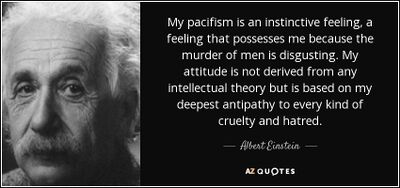Pacifism
(philosophy) | |
|---|---|
| Interest of | Clifford Allen |
| The belief in achieving a peaceful world through peaceful means. | |
Pacifism is the belief in achieving a peaceful world through peaceful means.
Definition
Pacifism covers a spectrum of views, including the belief that international disputes can and should be peacefully resolved, calls for the abolition of the institutions of the military and war, opposition to any organization of society through governmental force, rejection of the use of physical violence to obtain political, economic or social goals, the obliteration of force, and opposition to violence under any circumstance, even defence of self and others.
Do what you can with what you have
One of community organizer Saul Alinsky's theses is "You do what you can with what you have and clothe it with moral garments" [2]. Alinsky uses the example of Mahatma Gandhi’s concept of ‘passive resistance’ as an illustration. He points out that perhaps ‘passive resistance’ was simply:
“the only intelligent, realistic, expedient program which Gandhi had at his disposal; and that the ‘morality’ which surrounded this policy of passive resistance was to a large degree a rationale to cloak a pragmatic program with a desired and essential moral cover…. Confronted with the issue of what means he could employ against the British, we come to the other criteria previously mentioned; that the kind of means selected and how they can be used is significantly dependent upon the face of the enemy, or the character of his opposition. Gandhi’s opposition not only made the effective use of passive resistance possible but practically invited it. His enemy was a British administration characterized by an old, aristocratic, liberal tradition, one which granted a good deal of freedom to its colonials and which always had operated on a pattern of using, absorbing, seducing, or destroying, through flattery or corruption, the revolutionary leaders who arose from the colonial ranks. This was the kind of opposition that would have tolerated and ultimately capitulated before the tactic of passive resistance.”
Saul Alinsky (1972) [3]
References
- ↑ https://www.goodreads.com/quotes/52424-my-pacifism-is-an-instinctive-feeling-a-feeling-that-possesses
- ↑ Saul Alinsky Rules for Radicals 1972: 36-45
- ↑ https://infed.org/mobi/saul-alinsky-community-organizing-and-rules-for-radicals/
